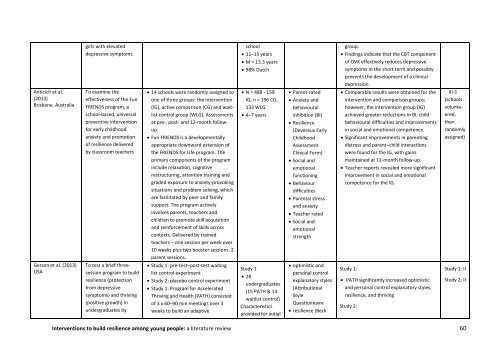Interventions to build resilience among young people A literature review
Interventions-to-build-resilience-among-young-people
Interventions-to-build-resilience-among-young-people
You also want an ePaper? Increase the reach of your titles
YUMPU automatically turns print PDFs into web optimized ePapers that Google loves.
girls with elevated<br />
depressive symp<strong>to</strong>ms.<br />
school<br />
11–15 years<br />
M = 13.3 years<br />
98% Dutch<br />
group.<br />
Findings indicate that the CBT component<br />
of OVK effectively reduces depressive<br />
symp<strong>to</strong>ms in the short term and possibly<br />
prevents the development of a clinical<br />
depression<br />
Anticich et al.<br />
(2013)<br />
Brisbane, Australia<br />
To examine the<br />
effectiveness of the Fun<br />
FRIENDS program, a<br />
school-based, universal<br />
preventive intervention<br />
for early childhood<br />
anxiety and promotion<br />
of <strong>resilience</strong> delivered<br />
by classroom teachers<br />
14 schools were randomly assigned <strong>to</strong><br />
one of three groups: the intervention<br />
(IG), active comparison (CG) and waitlist<br />
control group (WLG). Assessments<br />
at pre-, post- and 12-month followup.<br />
Fun FRIENDS is a developmentally<br />
appropriate downward extension of<br />
the FRIENDS for Life program. The<br />
primary components of the program<br />
include relaxation, cognitive<br />
restructuring, attention training and<br />
graded exposure <strong>to</strong> anxiety-provoking<br />
situations and problem solving, which<br />
are facilitated by peer and family<br />
support. The program actively<br />
involves parents, teachers and<br />
children <strong>to</strong> promote skill acquisition<br />
and reinforcement of skills across<br />
contexts. Delivered by trained<br />
teachers – one session per week over<br />
10 weeks plus two booster sessions. 2<br />
parent sessions.<br />
N = 488 - 159<br />
IG, n = 196 CG,<br />
133 WLG<br />
4–7 years<br />
Parent-rated<br />
Anxiety and<br />
behavioural<br />
inhibition (BI)<br />
Resilience<br />
(Devereux Early<br />
Childhood<br />
Assessment<br />
Clinical Form)<br />
Social and<br />
emotional<br />
functioning<br />
Behaviour<br />
difficulties<br />
Parental stress<br />
and anxiety<br />
Teacher rated<br />
Social and<br />
emotional<br />
strength<br />
Comparable results were obtained for the<br />
intervention and comparison groups;<br />
however, the intervention group (IG)<br />
achieved greater reductions in BI, child<br />
behavioural difficulties and improvements<br />
in social and emotional competence.<br />
Significant improvements in parenting<br />
distress and parent–child interactions<br />
were found for the IG, with gains<br />
maintained at 12-month follow-up.<br />
Teacher reports revealed more significant<br />
improvement in social and emotional<br />
competence for the IG.<br />
III-1<br />
(schools<br />
volunteered,<br />
then<br />
randomly<br />
assigned)<br />
Gerson et al. (2013)<br />
USA<br />
To test a brief threesession<br />
program <strong>to</strong> <strong>build</strong><br />
<strong>resilience</strong> (protection<br />
from depressive<br />
symp<strong>to</strong>ms) and thriving<br />
(positive growth) in<br />
undergraduates by<br />
Study 1: pre-test–post-test waiting<br />
list control experiment<br />
Study 2: placebo control experiment<br />
Study 1: Program for Accelerated<br />
Thriving and Health (PATH) consisted<br />
of 3 x 60–90 min meetings over 3<br />
weeks <strong>to</strong> <strong>build</strong> an adaptive<br />
Study 1<br />
28<br />
undergraduates<br />
(15 PATH & 13<br />
waitlist control)<br />
Characteristics<br />
provided for initial<br />
optimistic and<br />
personal control<br />
explana<strong>to</strong>ry styles<br />
(Attributional<br />
Style<br />
Questionnaire<br />
<strong>resilience</strong> (Beck<br />
Study 1:<br />
PATH significantly increased optimistic<br />
and personal control explana<strong>to</strong>ry styles,<br />
<strong>resilience</strong>, and thriving<br />
Study 2:<br />
Study 1: II<br />
Study 2: II<br />
<strong>Interventions</strong> <strong>to</strong> <strong>build</strong> <strong>resilience</strong> <strong>among</strong> <strong>young</strong> <strong>people</strong>: a <strong>literature</strong> <strong>review</strong> 60


